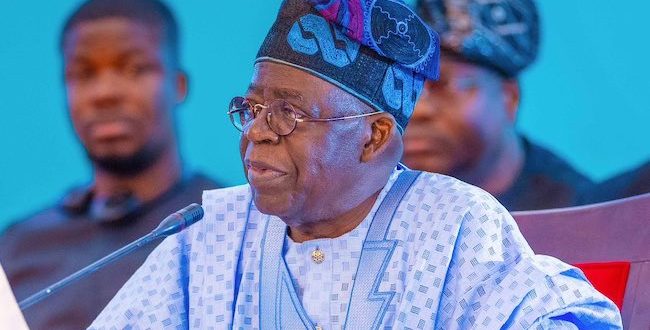525
By Lizzy Chirkpi
Just weeks after the Bola Tinubu-led administration assured Nigerians that a great portion of the nation’s debt had been settled, President Tinubu on Tuesday submitted a fresh request to the National Assembly, seeking approval to borrow a staggering $21.5 billion, €2.1 billion, and ¥15 billion.
The request also includes a grant of €65 million. This move has raised eyebrows and sparked reactions among citizens and analysts, who are questioning the government’s previous declarations on debt management.
The President’s request, outlined in a letter to the parliament, comes amidst the lingering economic impact of the removal of fuel subsidy, a policy implemented shortly after his assumption of office.
In the letter, President Tinubu stated, “In the light of the removal of the fuel subsidy and its impact on the national economy, approval is called for the borrowing plan, which amounts to USD 21,543,647,912, and EUR 2,193,856,324.54. And in Japanese Yen, 15 billion Yen and 65 million, respectively.”
He further explained the intended use of the funds, asserting that “This initiative aims to generate employment, promote skill acquisition, foster entrepreneurship, reduce poverty, and enhance food security, as well as to improve the livelihoods of Nigerians.”
The President noted that “Majority of these projects and programs will be implemented across all 36 states and the Federal Capital Territory.”
The government’s justification for the new borrowing plan hinges on the country’s “significant infrastructure deficit” and the power of financial resources needed to address this gap amid declining domestic demand. It has become essential to pursue prudent economic borrowing to close the financial shortfall,” Tinubu emphasised.
According to the President, these substantial funds will primarily be directed towards “critical infrastructural projects, including railways, healthcare among others.”
He highlighted the “market nature of these needs and the importance of stabilizing the economy,” stressing the urgency of seeking the consideration and approval of the House of Representatives for the 2025-2026 External Borrowing Plan.
“This will enable the government to fulfill its obligations to the Nigerian people through timely disbursement and effective project implementation,” the letter stated.
However, the timing of this extensive borrowing request has sparked considerable debate, particularly given the government’s recent public pronouncements regarding its success in settling Nigeria’s outstanding debts.
According to an X handle account (formerly Twitter) @paynedre1: “In a time when bold steps are necessary to reposition Nigeria’s economy and infrastructure, President Tinubu’s borrowing request is a strategic move toward growth and stability. With clear intentions to channel these funds into job creation, entrepreneurship, food security, healthcare, and nationwide infrastructure, this borrowing plan reflects a proactive approach to bridging our development gaps.
“Yes, borrowing must be done responsibly—but when tied directly to projects that uplift millions and strengthen our economy in the long term, it becomes an investment in our future. What matters now is transparency, accountability, and speed in implementation—three pillars this administration is committed to upholding.”
@Lonnewolf wrote, “IMF loan paid.
“Now he can collect bigger loans. The loan is good for the APC economy.
” Again, he’s said fuel subsidy is eating our future generations.
“This br@inless people and their supporters.
When Tinubu is done with Nigeria. Maybe we will go our separate ways then.”
@KenUttih writes, “$21.5 Billion????? Was fuel subsidy and electricity subsidy removal not meant to free up enough funds for the government to be used for these projects??? This is not a good sign. The amount involved over a 2 year period is enormous. I would like to see exactly the projects involved.
On his part @realshinny writes, “I don’t have all the details available to the president, but from my view – this may be too risky & may be coming a place of being too ambitious. Even if the loan is approved, all the projects can’t be completed in 6 years, and the president won’t be in power to control & ensure there is no mismanagement.”
President Tinubu borrowings since assuming office
Since May 2023, President Tinubu’s government has borrowed approximately $7.2 billion in external loans, all from the World Bank. These include: $750 million (June 2023) for power sector recovery, $500 million (June 2023) for women empowerment, $800 million (July 2023) for social safety nets, $700 million (September 2023) for adolescent girls’ education, $2.25 billion (June 2024) for economic stabilization, $1.57 billion (September 2024) for health, education, and power, and $632 million (March 2025) for nutrition and education. No confirmed loans from other institutions like the IMF or China. A $21.5 billion request (May 2025) is pending.



